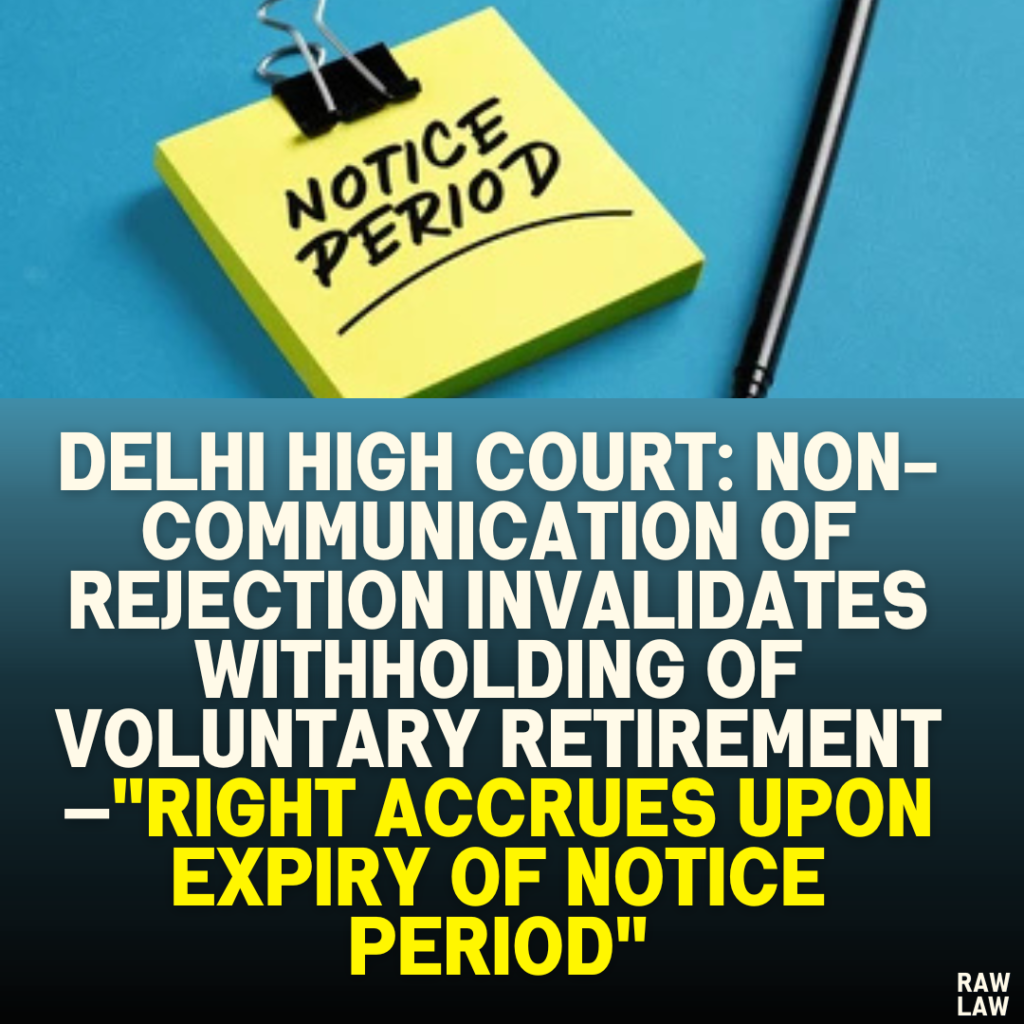Court’s Decision
The Delhi High Court held that the petitioner’s voluntary retirement was deemed to have taken effect from April 17, 2024, as the respondents failed to communicate any rejection of his application before the expiry of the notice period. The court emphasized that under Rule 56(k) of the Fundamental Rules (FRs), permission to retire can only be withheld under specific conditions, such as pending disciplinary or judicial proceedings, and such rejection must be explicitly communicated before the expiry of the notice period.
The court directed that all pensionary and retiral benefits be granted to the petitioner within two months from the date of the order.
Facts of the Case
- The petitioner was serving as a Superintending Engineer (Civil) in the Border Roads Organization (BRO).
- He applied for voluntary retirement under Rule 48 of the Central Civil Services (Pension) Rules, 1972 (CCS Pension Rules) by submitting applications on December 30, 2023, and March 30, 2024, modifying his retirement date to April 17, 2024.
- The petitioner had served in the General Reserve Engineer Force (GREF) for over 31 years, mainly in hilly and high-altitude terrains.
- Due to health issues (obesity, dyslipidemia, bronchial asthma) and family responsibilities (caring for his aged parents), he sought voluntary retirement.
- Despite reminders sent by his office on March 26, 2024, and himself on March 30, 2024, the respondents did not process his request, forcing him to file a writ petition.
Issues Before the Court
- Can an employee be deemed to have voluntarily retired under Rule 56(k) if the employer fails to communicate rejection before the expiry of the notice period?
- Does the existence of pending complaints or a Court of Inquiry (COI) affect the right to voluntary retirement under Rule 56(k)?
Petitioner’s Arguments
- The petitioner fulfilled all conditions under Rule 56(k) by giving a notice of more than three months.
- No disciplinary or judicial proceedings were pending against him.
- The employer did not issue any order rejecting or withholding permission before the expiry of the notice period.
- As per legal precedents, the right to voluntary retirement accrues automatically if no rejection is communicated in time.
- The petitioner relied on:
- State of Arunachal Pradesh v. Tai Nikio, 2019 SCC OnLine Gau 1392
- State of Haryana v. S.K. Singhal, (1999) 4 SCC 293
- These cases established that if an employer fails to communicate rejection before the expiry of the notice period, retirement takes effect automatically.
Respondent’s Arguments
- The respondents argued that before accepting voluntary retirement, vigilance clearance is required from the Legal Department.
- They sought clearance from the vigilance department, which revealed:
- The petitioner had been a defense witness in a departmental inquiry against another officer accused of corruption.
- A corruption complaint had been filed against the petitioner by one R.K. Garg, alleging serious misconduct.
- The petitioner was under investigation for an irregular House Rent Allowance (HRA) claim, for which a Court of Inquiry (COI) was ordered on March 26, 2024.
- The respondents claimed that because of these pending inquiries, his voluntary retirement request was not considered.
Analysis of the Law
Rule 56(k) of the Fundamental Rules (FRs)
This rule states that a government servant may retire voluntarily by giving at least three months’ notice. However, the Proviso to Rule 56(k) allows the employer to withhold permission in three specific conditions:
- The employee is under suspension.
- A charge sheet has been issued, and disciplinary proceedings are pending.
- Judicial proceedings for grave misconduct are pending.
Thus, for the employer to legally withhold permission, at least one of these conditions must be met, and the decision must be communicated before the expiry of the notice period.
Precedent Analysis
1. Tai Nikio (2019 SCC OnLine Gau 1392)
- If an employer fails to communicate a decision within the notice period, the retirement is deemed accepted.
- Any subsequent attempt to withhold retirement is invalid.
2. S.K. Singhal (1999) 4 SCC 293
- If the rules do not expressly allow withholding permission except under specific contingencies, retirement automatically takes effect once the notice period expires.
- If the employer intends to reject the request, it must issue an order and communicate it before the expiry of the notice period.
Court’s Reasoning
- The petitioner’s notice period expired without rejection being communicated, meaning his voluntary retirement took effect automatically on April 17, 2024.
- Pending COI or complaints do not justify withholding retirement under Rule 56(k), because:
- No charge sheet was issued against the petitioner.
- He was not under suspension.
- The respondents never issued an order withholding permission.
- The respondents cannot retrospectively deny voluntary retirement. The law states that if an employer intends to reject retirement, they must expressly communicate this decision before the expiry of the notice period.
- Since the petitioner was not informed in time, his right to retirement crystallized upon expiry of the notice period.
Conclusion
- The Delhi High Court allowed the writ petition, declaring that:
- The petitioner voluntarily retired on April 17, 2024.
- He is entitled to all pensionary and retiral benefits as per service rules.
- The respondents must release his benefits within two months.
Implications of the Judgment
- Strict Adherence to Rule 56(k)
- Employers must communicate rejection before the expiry of the notice period, or else retirement is deemed to have taken place.
- Pending Inquiries or Complaints Are Not Enough to Deny Retirement
- If an employee has not been charge-sheeted or placed under suspension, pending complaints or COIs do not justify withholding voluntary retirement.
- Precedent for Future Cases
- This ruling reinforces an employee’s right to voluntary retirement if the employer fails to act within the prescribed time.
- Administrative Compliance
- Government departments must follow procedural requirements before withholding retirement, ensuring that employees’ rights are not violated due to bureaucratic inaction.
